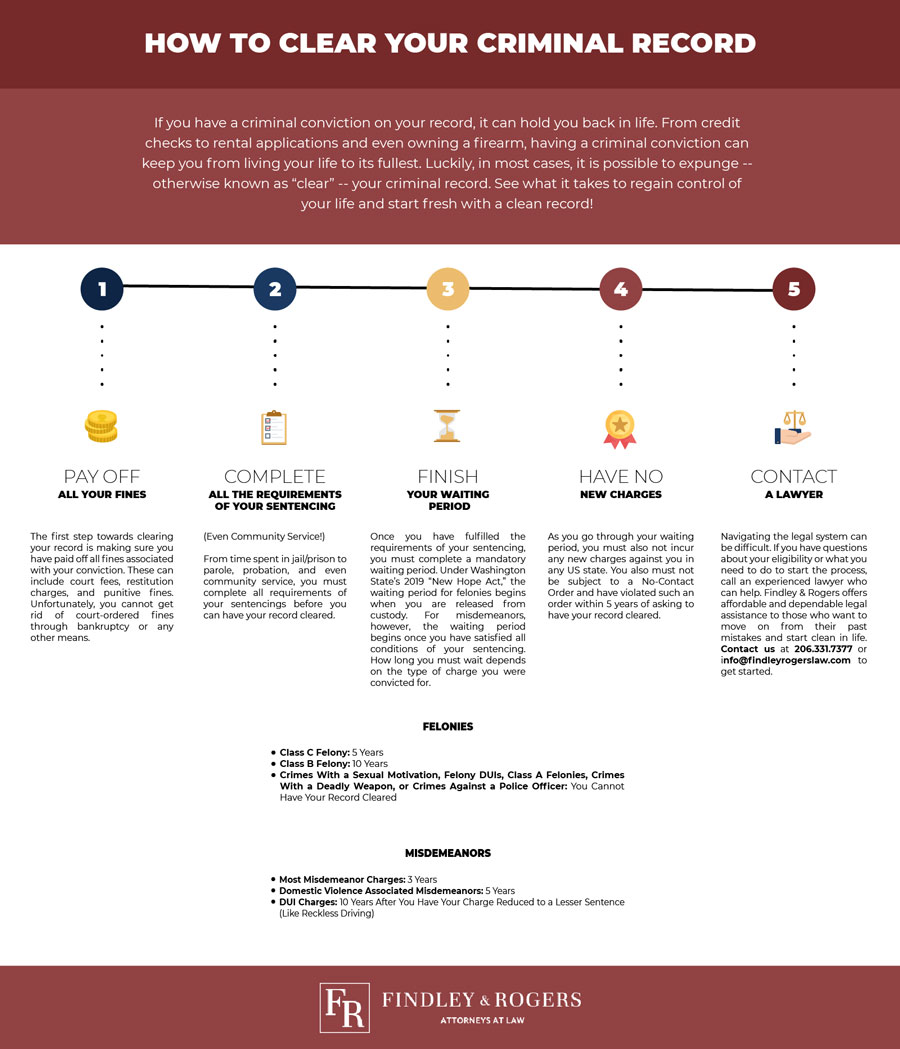How to Expunge Your Record in 5 Steps
If you have an old conviction on your record, it can hold you back. Here’s our guide on how to clear your criminal record in 5 steps.
1. Finish Paying All Court-Ordered Fines & Restitution
For many people, this is the hardest part of how to expunge a record. Once you have finished your sentence, you will need to pay back the court fines, plaintiff attorney fees, restitution charges, and punitive fines you may have incurred.
For many people, paying off their fines after their conviction can be difficult. There are bills and rent to pay. Many men and women have a family to take care of, too — not to mention court fines are expensive.
But you have to start somewhere. When it comes to how to clear a criminal record, you have to pay the fines the court ordered you to pay. Start making payments as best you can. It’s a huge step to begin paying what you owe, but to actually get an expungement, you need to have paid back the entire amount you owe before you can begin the expungement process.
2. Carry Out All Court-Mandated Sentencing Requirements
When it comes to how to expunge a record, you can see that it’s not something you can do overnight. At your sentencing, the court likely ordered you to do more than just pay fines. You may have received jail time, parole, probation, or community service. Just like paying your fines, you must complete all of these other requirements before you can expunge your record.
3. Complete the Mandatory Waiting Period
This is another step in the long journey of how to expunge a record. Under the 2019 New Hope Act, this has changed somewhat, for felony cases your wait now starts as soon as you are out of custody, though you do still have to complete your sentence requirements. For misdemeanors the wait starts after you’ve completed all of your sentencing requirements. You can’t expunge a criminal conviction without completing this waiting period first. There’s no way to speed up the clock, either — all you can do is wait.
In theory, when thinking about how to clear a criminal record, the reason for the mandatory waiting period is that it serves as another punishment. As a result of your crime, you have to live for a certain amount of time with the conviction on your record—and all the disadvantages that go with that—before you’re allowed to expunge the conviction and restore your life to normal.
Your waiting period is also a time to prove to the court that you’ve reintegrated into society as a reformed, productive member of society. If you can go through the waiting period without any new convictions, it tells the court you’re back on the right track.
When it comes to how to expunge your record in Washington State, there are different lengths of waiting periods depending on the type of crime:
Felonies
- Class C Felony: 5 Years
- Class B Felony: 10 Years
- Most Crimes With a Sexual Motivation, DUIs, Class A Felonies, Assault or Robbery With a Deadly Weapon, or Crimes Against a Police Officer: You Cannot Have Your Record Cleared
Misdemeanors
- Most Misdemeanor Charges: 3 Years
- Domestic Violence Associated Misdemeanors: 5 Years
- Charges That Started as DUI and Were Amended to Lesser Offenses: 10 Years After You Have Your Charge Reduced to a Lesser Offense (Like Reckless Driving)
4. Avoid New Convictions or Charges
If you’re looking into how to clear a criminal record, it’s important to understand that you must not incur any new charges while you are in your waiting period. If you get another conviction in any US state while doing any of the first four steps, it can set you back to square one. You also must not be subject to a No-Contact Order and have violated such an order within 5 years of asking to have your record cleared.
5. Get Good Legal Assistance & Make Your Case to the Court
Once you’ve repaid your debts to society and completed the mandatory waiting period, you’re ready to petition the court to expunge the criminal conviction. It has all come down to this!
Unfortunately, there’s one big hurdle still standing in your way: most people don’t know the technical procedures for how to expunge a record. Our legal system is extremely complicated and unfriendly to ordinary members of the public.
If you have completed the eligibility requirements, it is your right under the law to petition to have your conviction expunged. Yet, if you tried to do it on your own, you would have to spend many hours doing legal research, and even then, it’s difficult to know if you’ve done everything correctly. The court might very well deny your petition on a technicality.
Let Findley & Rogers Help
If you want to learn how to clear a criminal record, the best answer is: let an experienced lawyer help you! Save yourself the trouble and the doubt of trying to do it alone! Our team of attorneys at Findley & Rogers can help you cross the finish line and expunge your conviction once and for all. When you’re ready, just contact us for a free consultation!
Get your life back on track — contact us today to learn more about how to expunge or seal your record in Washington State!


